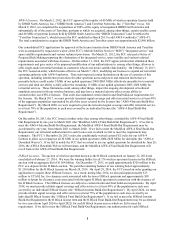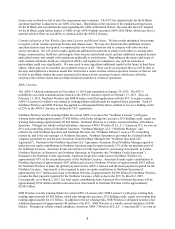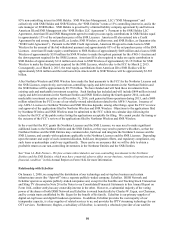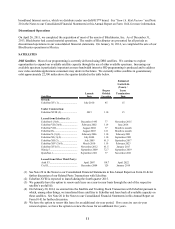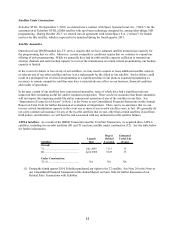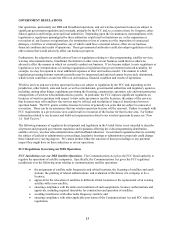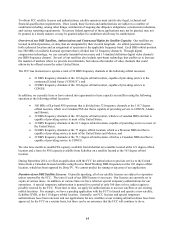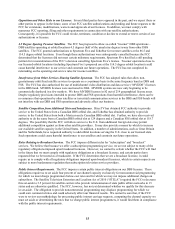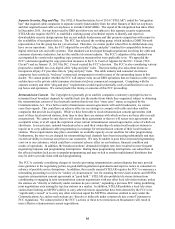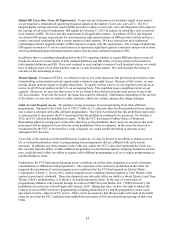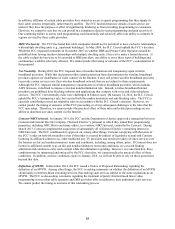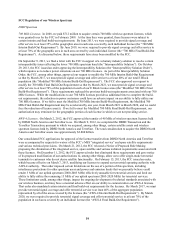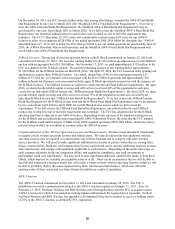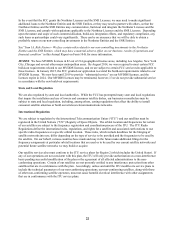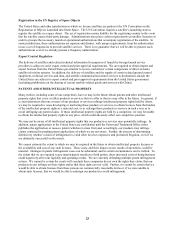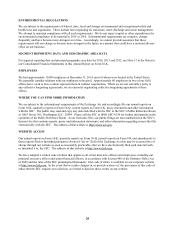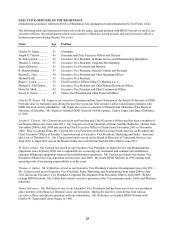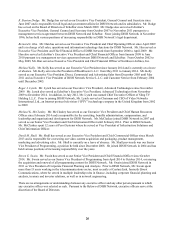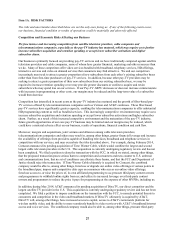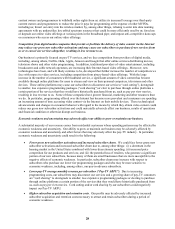Dish Network 2014 Annual Report Download - page 28
Download and view the complete annual report
Please find page 28 of the 2014 Dish Network annual report below. You can navigate through the pages in the report by either clicking on the pages listed below, or by using the keyword search tool below to find specific information within the annual report.18
18
In addition, affiliates of certain cable providers have denied us access to sports programming that they supply to
their cable systems terrestrially, rather than by satellite. The FCC has held that new denials of such service are
unfair if they have the purpose or effect of significantly hindering us from providing programming to consumers.
However, we cannot be sure that we can prevail in a complaint related to such programming and gain access to it.
Our continuing failure to access such programming could materially and adversely affect our ability to compete in
regions serviced by these cable providers.
MDU Exclusivity. The FCC has found that cable companies should not be permitted to have exclusive relationships
with multiple dwelling units (e.g., apartment buildings). In May 2009, the D.C. Circuit upheld the FCC’s decision.
While the FCC requested comments in November 2007 on whether DBS and Private Cable Operators should be
prohibited from having similar relationships with multiple dwelling units, it has yet to make a formal decision. If
the cable exclusivity ban were to be extended to DBS providers, our ability to serve these types of buildings and
communities would be adversely affected. We cannot predict the timing or outcome of the FCC’s consideration of
this proposal.
Net Neutrality. During 2010, the FCC imposed rules of nondiscrimination and transparency upon wireline
broadband providers. While this decision provides certain protection from discrimination by wireline broadband
providers against our distribution of video content via the Internet, it may still permit wireline broadband providers
to provide certain services over their wireline broadband network that are not subject to these requirements.
Although the FCC imposed similar transparency requirements on wireless broadband providers, which includes
AWS licensees, it declined to impose a wireless nondiscrimination rule. Instead, wireless broadband Internet
providers are prohibited from blocking websites and applications that compete with voice and video telephony
services. The FCC’s net neutrality rules were challenged in Federal court. On January 14, 2014, the D.C. Circuit
upheld the FCC’s transparency rule, but vacated both the nondiscrimination and anti-blocking rules. The FCC is
currently considering revised net neutrality rules in accordance with the D.C. Circuit’s decision. However, we
cannot predict the timing or outcome of this FCC proceeding or of any subsequent challenges to the rules that the
FCC may adopt. Therefore, we cannot predict the practical effect of these rules and related proceedings on our
ability to distribute our video content via the Internet.
Comcast-NBCUniversal. In January 2011, the FCC and the Department of Justice approved a transaction between
Comcast and General Electric Company (“General Electric”), pursuant to which they joined their programming
properties, including NBC, Bravo and many others, in a venture, NBCUniversal, controlled by Comcast. During
March 2013, Comcast completed the acquisition of substantially all of General Electric’s remaining interest in
NBCUniversal. The FCC conditioned its approval on, among other things, Comcast complying with the terms of
the FCC’s order on network neutrality (even if that order is vacated by judicial or legislative action) and Comcast
licensing its affiliated content to us, other traditional pay-TV providers and certain providers of video services over
the Internet on fair and nondiscriminatory terms and conditions, including, among others, price. If Comcast does not
license its affiliated content to us on fair and nondiscriminatory terms and conditions, we can seek binding
arbitration and continue to carry such content while the arbitration is pending. However, it is uncertain how these
conditions may be interpreted and enforced by the FCC; therefore, we cannot predict the practical effect of these
conditions. In addition, as these conditions expire in January 2018, we will not be able to rely on these protections
beyond that date.
Definition of MVPD. In December 2014, the FCC issued a Notice of Proposed Rulemaking regarding the
definition of an MVPD. Among other things, the FCC is seeking comments on whether the definition of an MVPD
should apply to Internet-based streaming services, thus making such services subject to the same regulations as an
MVPD. The FCC is also seeking comments regarding the treatment of purely Internet-based linear video
programming services that cable operators and DBS providers offer in addition to their traditional video services.
We cannot predict the timing or outcome of this rulemaking process.


